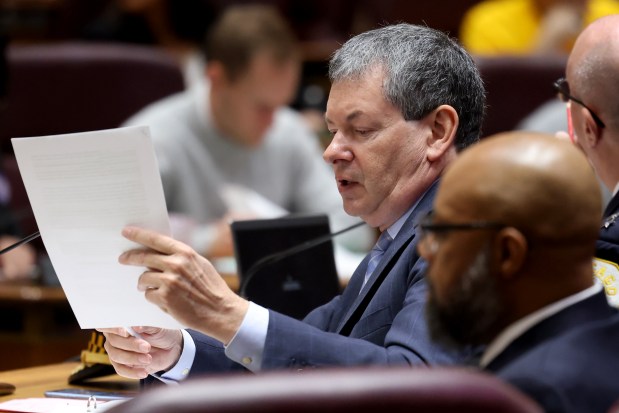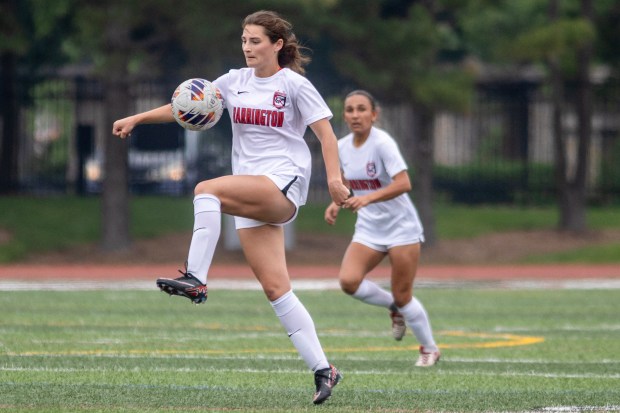Aldermen waffled Wednesday on a proposal to give Chicago’s top public safety leaders the power to declare “snap curfews” in an effort to curb so-called “teen takeovers,” delaying a vote on the contentious idea after a five-hour debate.
Facing a razor-thin roll call and requests for more time, along with deep concerns from opponents about how officials might use the new curfew authority, Ald. Brian Hopkins called off the vote on his ordinance in the City Council’s Public Safety Committee.
The decision stalls an effort by some aldermen to decisively shape Chicago’s policing policy in response to a handful of high-profile violent incidents at large gatherings of teens, with or without Mayor Brandon Johnson’s support. But Hopkins said the committee he chairs will vote on the measure soon, possibly next week, and added he is confident it will pass.
“We’ve come too far in a collaborative spirit with the discussion right now to use a heavy hand and force this through,” said Hopkins, who has aggressively pushed for police to get more curfew powers since two recent large youth gatherings in his downtown ward ended in shootings.
Hopkins had initially sought an 8 p.m. downtown curfew, then a measure to give dozens of police leaders the ability to declare emergency teen curfews. He worked with Johnson’s administration and police Superintendent Larry Snelling to shape the ordinance advanced Wednesday.
In the compromise legislation Hopkins finally circulated Tuesday evening, the Deputy Mayor for Community Safety — currently Garien Gatewood — would need to sign off in addition to the police superintendent to enact a temporary curfew to try to force teens in a particular area to disperse or face arrest.
That deal followed weeks of measured pushback from Johnson, who aired his opposition to blanket curfews and targeting only downtown areas. The city should instead focus on creating safe, inviting spaces for young people to gather, he has argued.
The mayor is in a difficult position politically. While large segments of his progressive base oppose granting the special curfew power, many aldermen and their constituents want to see something more done to prevent the gatherings from getting out of hand.
Underscoring the controversy swirling around the issue, Gatewood declined to say whether Johnson wants the ordinance to pass. But if it does, the mayor would utilize the power to impose curfews to prevent or end gatherings, even though he still questions the constitutionality of the measure, Gatewood told the Tribune before the vote.
“We’re going to continue to make sure we support the work that needs to happen to keep people safe.” Gatewood said. “We will use any tool that’s necessary to keep people safe.”
Teens are currently governed by a decades-old 10 p.m. citywide curfew, with limited exceptions. The mayor’s administration and CPD already work closely to prevent such large youth gatherings when they are advertised ahead of time in widely distributed social media posts, he added.
Johnson has poured money into community violence prevention efforts and the city’s youth summer jobs program, to which he has added 5,000 positions in the last two years. Violent crime has broadly dropped throughout the city compared with last year — part of a nationwide trend — with shootings down 31% through April, according to CPD.
Hopkins has touted the 32 co-sponsors signed on to his ordinance and said he believes he could obtain a veto-proof majority if it eventually advances and faces a final full City Council vote.
The addition of a safeguard controlled by the mayor did little Wednesday to win over skeptics who feared the ordinance cracks down too hard on teens and potentially violates their civil rights.
Ald. Maria Hadden, 49th, likened the effort to control where teens go to the 1984 film “Footloose,” in which a young Chicago man moves to a small town where authorities have outlawed dancing. She told her colleagues police already have the power to break up unruly gatherings.
“I appreciate the problem,” she said. “I question the efficacy of what’s proposed… Why do you need this? Why can’t you just do the monitoring?”
But others, including several Black aldermen closely allied with the mayor, argued the ordinance is needed.
“What we’re seeing in our public spaces — the firearms, the fights, the property damage — cannot be tolerated. We have to seek ways of addressing that,” Ald. Pat Dowell, 3rd, said. “If this is a tool the Police Department says that they need, I support that.”
Snelling cautiously praised the curfew powers that would be placed into his hands as a potentially effective tool earlier this week. The department sent Chief of Patrol Jon Hein to Wednesday’s committee meeting, where the high-ranking Snelling deputy strongly advocated for the measure.
Downtown Ald. Bill Conway, 34th, argued the ordinance is not strong enough. By giving Gatewood — and thus the mayor’s office — control over curfew implementation, the final product “doesn’t do anything.”
“Snelling is in a better place to make that decision than the deputy mayor,” Conway said. “It’s a compromise that makes the entire ordinance null and void.”
Ald. Silvana Tabares, 23rd, echoed Conway by requesting the need for deputy mayor approval be removed from the ordinance, a bid to instead place the curfew power solely in the superintendent’s hands. The committee voted down the effort in a 7-to-10 vote.
But the wary, split aldermen ultimately decided to push the decision off. As the hearing stretched into the late afternoon, Ald. Ruth Cruz aired misgivings over details in the ordinance, such as its definition of large gatherings as 20 or more people.
“There are pieces that are missing,” Cruz, 30th, said. “It is a complicated issue with a lot of gray areas.”
Hopkins said he wanted the vote to move forward, but deferred during the meeting to his two lead co-sponsors, Alds. Pat Dowell and Jason Ervin, who advocated for a brief wait.
“We need to do something,” Ervin, 28th, said. “Let’s not hold hostage. If we need a few days, that’s fine, but we should not let this tear beyond our meeting moving forward.”
“I would support having more conversation on this,” added Dowell. “But not a lot. Summer is upon us.”
The debate is likely to remain a top focus at City Hall. And as they field calls from concerned constituents, aldermen will also hear from troubled civil rights groups, who Ald. Jessie Fuentes said were not invited by Hopkins to answer aldermen’s questions despite her request.
Ed Yohnka, spokesperson for the American Civil Liberties Union of Illinois, called the compromise ordinance a “modest improvement” Tuesday evening, but argued curfews have repeatedly failed to improve safety where implemented. He shared concerns the ordinance could someday be used by a mayor to impede protests.
“Could this be abused in a way that could curtail that right? Absolutely,” Yohnka said. “And then even more broadly than that, young people have the right to be in every part of the city.”
Yohnka declined to say if ACLU Illinois would sue the city if the ordinance passes.
Kofi Ademola, co-founder of the anti-violence group GoodKids MadCity, similarly declined to say whether his organization would sue. GoodKids MadCity sued the city in October 2022 after Mayor Lori Lightfoot stiffened curfew rules months earlier following the fatal shooting of a 16-year-old during a large Millennium Park gathering.
Hopkins defended the ordinance’s constitutionality during the meeting and said it had been drafted with input from city and CPD lawyers.
Good Kids Mad City files lawsuit to stop enforcement of youth curfew on Halloween
Ademola called the ability for police to “arbitrarily” declare a curfew “very problematic.” He argued police will not effectively de-escalate unruly gatherings and added the curfew could be used in unexpected ways.
And he called on Johnson to veto the ordinance if it passes, a potential action the mayor has not ruled out.
“Some things you just can’t fold on,” Ademola said.




